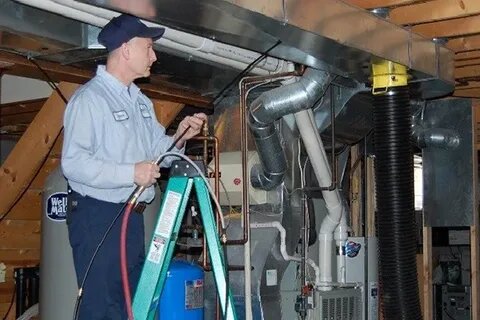Introduction
If you’ve ever looked up at your ceiling vents and wondered who actually makes sure the people cleaning those ducts know what they’re doing, you’re not alone. Air duct cleaning, especially using negative pressure systems, is one of those things that sounds super technical but impacts your everyday life more than you might think. The idea is simple: professionals use a special method to suck dust, mold, and allergens out of your air system. But the process isn’t just about putting a vacuum to a vent—there are rules, safety standards, and practices that keep things legit. That’s where regulation comes in. And if you’re living in Colorado Springs, knowing who’s in charge of these standards is a good way to protect your home, health, and wallet. Colorado Springs Negative Pressure Air Duct Cleaning is one of the trusted local names that takes these standards seriously.
1. Key Features That Must Meet Standards
Not all air duct cleanings are created equal. There are some very specific things professionals need to do—and do right—to make sure your ducts are cleaned properly using negative pressure. Here’s what those features look like when they’re done to standard:
- Sealed System Setup: The entire duct system should be sealed off so contaminants don’t leak into your home during cleaning.
- High-Suction Negative Pressure Units: These aren’t just shop vacs—they’re industrial-grade vacuum systems strong enough to pull out deeply embedded debris.
- Agitation Tools: Brushes, air whips, or compressed air tools break up the buildup so it can be vacuumed away.
- Disposal Protocol: Waste must be removed properly to avoid recontamination.
If a company skips any of these or uses subpar equipment, they’re not meeting the informal industry standards that groups like the National Air Duct Cleaners Association (NADCA) recommend—even if there’s no local law enforcing it. Companies that truly care will still follow these guidelines.
2. Why Safety Standards Matter More Than You Think
When we talk about safety in duct cleaning, we’re not just talking about ladders and power cords. We’re talking about:
- Air Quality: If a duct cleaning job stirs up mold, allergens, or even asbestos without proper control, your indoor air could get worse instead of better.
- Cross-Contamination: Without correct sealing and suction, dust and debris can end up in places it shouldn’t—like your living room or HVAC unit.
- Fire Risks: In commercial buildings, especially with dryers or kitchens, improperly cleaned ducts can become fire hazards.
Here’s the catch: in many places, including Colorado Springs, there’s no specific government agency that inspects or licenses air duct cleaning companies. That’s why associations like NADCA set the “unofficial rules,” and responsible companies train their staff, follow protocols, and get certified even though it’s not required by law.
“The best companies don’t wait for regulation—they lead with responsibility.”
That’s exactly what reputable businesses do. They go above and beyond the bare minimum because safety is personal.
3. How Much Does It Cost—And Is It Worth It?
Let’s be real. Nobody wants to spend money on cleaning something they never see. But dirty air ducts are like a clogged filter you never change—eventually, the whole system suffers.
| Service Quality | Typical Cost Range | What You Get |
|---|---|---|
| Certified & Regulated Approach | $400 – $700 | Full system vacuum, sealing, inspections |
| Cheap/Non-Certified Cleaners | $100 – $250 | Surface-only cleaning, no guarantees |
| Emergency or Add-On Services | $100 – $300 extra | Mold removal, duct sanitizing, after-hours |
What’s important is asking the right questions. Is the company NADCA-certified? Do they use negative pressure machines or just blow dust around? Are they insured? Good answers usually come with higher price tags—but those extra bucks mean better air and peace of mind.
4. Regulation in Emergency Situations
You’d be surprised how often air duct cleaning turns into an emergency—especially when water leaks, mold, or even fire damage is involved. In those cases, it’s not just about cleanliness. It’s about containing hazardous material and restoring safety quickly.
Now here’s the part most homeowners don’t know: during emergencies, local health departments and building inspectors might get involved, especially if there’s risk to public health. And even though regular duct cleanings aren’t tightly regulated, emergency services are monitored more closely.
Reputable companies should:
- Work under certified remediation protocols
- Wear protective gear
- Provide post-cleaning air quality tests
- Communicate clearly with city or county inspectors if required
In these moments, companies like Colorado Springs Negative Pressure Air Duct Cleaning really shine. They know the drill, have the proper insurance, and follow the guidelines that matter when stakes are high.
FAQs
Q1: Is air duct cleaning actually regulated by law in Colorado Springs?
A: Not directly. There’s no specific state law that requires licenses for duct cleaners, but best practices are shaped by NADCA standards and general business regulations like insurance, safety, and honesty in advertising.
Q2: What does “negative pressure” mean, and why is it important?
A: It’s a vacuum-based method that sucks contaminants out of your ducts instead of just pushing them around. It’s the most effective way to clean without causing mess or exposure.
Q3: Can I ask a company for proof of their standards?
A: Absolutely. Ask for NADCA certification, proof of insurance, or even a walkthrough of their process. Good companies won’t hesitate to show you how they work.
Q4: Are emergency duct cleaning services more expensive?
A: Typically yes, especially if they’re responding after hours or dealing with mold, fire, or water damage. But those services often require special handling and gear.
Conclusion
So, who regulates Colorado Springs negative pressure air duct cleaning standards? Technically, no one does it officially. But that doesn’t mean standards don’t exist. The real regulators are responsible businesses that follow industry protocols, keep up with training, and respect your home like it’s their own.
Companies like Colorado Springs Negative Pressure Air Duct Cleaning take those standards seriously—not because someone told them to, but because it’s the right thing to do. As a homeowner, your best move is to stay informed, ask smart questions, and pick professionals who care about doing it right—even when no one’s watching. Clean air starts with clean choices. Make yours count.
Read More: Colorado Springs Air Duct Cleaning


